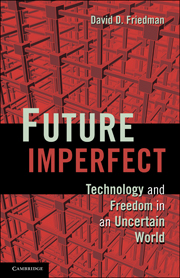Book contents
- Frontmatter
- Contents
- PART ONE PROLOGUE
- PART TWO PRIVACY AND TECHNOLOGY
- 3 A World of Strong Privacy
- 4 Information Processing: Threat or Menace? Or If Information Is Property, Who Owns It?
- 5 Surveillance Technology: The Universal Panopticon
- PART THREE DOING BUSINESS ONLINE
- PART FOUR CRIME AND CONTROL
- PART FIVE BIOTECHNOLOGIES
- PART SIX THE REAL SCIENCE FICTION
- Notes
- Bibliography
- Index
4 - Information Processing: Threat or Menace? Or If Information Is Property, Who Owns It?
Published online by Cambridge University Press: 18 August 2009
- Frontmatter
- Contents
- PART ONE PROLOGUE
- PART TWO PRIVACY AND TECHNOLOGY
- 3 A World of Strong Privacy
- 4 Information Processing: Threat or Menace? Or If Information Is Property, Who Owns It?
- 5 Surveillance Technology: The Universal Panopticon
- PART THREE DOING BUSINESS ONLINE
- PART FOUR CRIME AND CONTROL
- PART FIVE BIOTECHNOLOGIES
- PART SIX THE REAL SCIENCE FICTION
- Notes
- Bibliography
- Index
Summary
Some years ago I decided to set up my own web site. One question was how much of my life to include. Did I want someone looking at my academic work – perhaps a potential employer – to discover that I had put a good deal of time and energy into researching medieval recipes, a subject unrelated to either law or economics, thus (arguably) proving that I was a dilettante rather than a serious scholar? Did I want that same potential employer to discover that I held unfashionable political opinions, ranging from support for drug legalization to support for open immigration? And did I want someone who might be outraged at my political views to be able to find out what I and my family members looked like and where we lived?
I concluded that keeping my life in separate compartments was not a practical option. I could have set up separate sites for each part, with no links between them – but anyone with a little enterprise could have found them all with a search engine. And even without a web site, anyone who wanted to know about me could find vast amounts of information by a quick search of Usenet, where I have been an active poster for more than fifteen years. Keeping my virtual mouth shut was not a price I was willing to pay, and nothing much short of that would do the job.
- Type
- Chapter
- Information
- Future ImperfectTechnology and Freedom in an Uncertain World, pp. 54 - 65Publisher: Cambridge University PressPrint publication year: 2008



